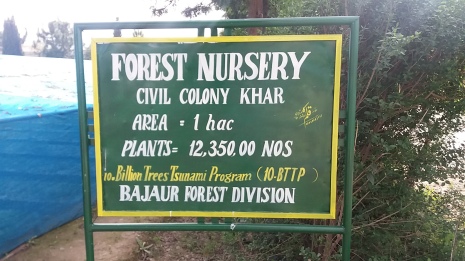Hej kära bloggläsare!
Här kommer det andra gästblogginlägget av Shah Khalid, miljöjournalist i Pakistan. Läs och lär dig om det nationella trädplanteringsinitiativet i Pakistan som bidrar till att ta upp mer koldioxid, gynna biologisk mångfald och förbättra luftkvaliteten.
By shah Khalid shah jee
Climate change presents a huge risk for developing countries because they have already suffered many devastating environmental events. Although many phenomena contribute to climate change, one of the worst is deforestation. Experts consider the amount of forest area an indicator for how developed a country is. If forest land makes up more than 25 percent of the total area of a country, it is considered developed. But unfortunately, in Pakistan this indicator is very low – only three to four percent of the whole country is forest land. This is a very low percentage compared to developed countries.

Plants and trees are the main source of fresh air and a major contributor to a clean environment everywhere. Recognizing the importance of forests and plants, the government of Pakistan has started a project which is called “10 billion trees”, in which 10 billion trees will be planted over ten years. Work on this project has begun throughout Pakistan including the tribal district Bajaur of KP province. During the spring, 0.7 million plants of different species like eucalyptus, mulberry, elantus, Cedrus Deodara (Pakistan National tree) and other local species were planted throughout the district. According to the Divisional Forest officer of Bajaur, Hayat Ali, the forest department has planted 0.2 million trees. The people of Bajaur love plants and trees so 0.5 million trees were distributed throughout Bajaur without charge. The plantation campaign is strictly monitored and the goal is to achieve 100 % plantation because the trees were distributed among people who particularly love trees and plants.

The forest department of Bajaur has an ongoing project on a three thousand acre area and they are also hoping to find other areas where they can plant trees. They have four nurseries in district Bajaur which are now completely empty because all the plants were planted in the spring plantation campaign. Now the nurseries will grow more plants for the coming monsoon plantation. According to Hayat Ali, they have established three more nurseries on ten hectares’ land of the Tehsil Khar areas and have a plan to raise 7.5 million plants of different species for future plantation seasons in the nurseries. He further said that they are decreasing the number of Eucalyptus trees in our nurseries because people have the misconception that Eucalyptus trees absorb water and cause a decrease in the water table. We have decreased the number of Eucalyptus trees by half because of this misconception. We now give priority to local species Toot (mulberry), Ghoraska, Kekar, Eluntus and others and our nurseries are growing. We also plan to establish Tube nurseries on a four hectare area which will mostly raise Cheer plants because Bajaur is a subtropical area and the Cedrus Deodara trees grow very well here. The forest department also plans to establish a bare rooted plants nursery for next season. For the upcoming plantation, we plan to distribute 2.5 million plants among the people of District Bajaur free of charge but purely on the basis of merit. Preference will be given to people who love plants. The remaining plants will be planted by the forest department in different ongoing schemes and in new areas chosen by the forest department for plantation.

The 10 Billion Trees plantation in Bajaur has three goals: 1: plantation by the forest department; 2: distribution of free trees among the local communities; 3: procurement and protection of natural forests which are badly damaged due to ruthless cutting of trees and deforestation. Due to the high rate of deforestation, the natural forests have lost their beauty. So as part of the third goal of the 10 billion trees project, they have set aside a 260-hectare area for natural seed sowing. They have created separate units, each of which will consist of a 40 hectare area. The forest department will protect these units by keeping animals out and not allowing people to cut the trees. A watcher from the local community will also be hired and paid a monthly salary. He will be trained in protection measures and, very importantly, to sow Cheer seeds in the forest while he is walking. This is a very important element of forest protection. In this way, we will be able to grow more trees in this natural way. If it works, we will have proved that if we care about and protect the forest then 2000 Cheer trees will grow in one hectare in just one year. This will be translating into a great number of trees in our 260 hectare area. This self germination of plants in the natural forest will continue for four to five years and will be very help to achieve full reforestation in district Bajaur of KP province.

According to the forest department statistic, there are 50,000 acres areas of forest in Bajaur which have mostly been planted by the forest department but there is a lot of land that is suitable for plantation. The 10 billion trees project covers the whole country so district Bajaur has been allocated a very large amount of land and trees.

According to climate change experts, carbon is the biggest cause of global warming and climate change. Trees are the only cheap and simple way to reduce the amount of carbonin the air. According to the experts, one tree absorbs 120 kg of carbon and expels 20 kg of oxygen. Therefore, this 10 billion trees project will bring a very pleasant change to the environment within four or five years in the whole country, and especially in tribal district Bajaur. It is the duty of every person to take an active part in plantation and make sure this unique tree plantation project is a great success.
Save nature save lives.
